Understanding Dental Surgery for Pets at Arcata Animal Hospital
Pet Dental Health: A Key to Wellness
Dental health is a vital yet often overlooked aspect of pet care. Just like in humans, poor oral hygiene can lead to pain, infection, and systemic health issues in pets. At Arcata Animal Hospital, we emphasize preventative dental care to help pets live healthier, longer lives.
Studies show that by the age of three, most pets exhibit signs of dental disease. It often begins as mild gingivitis—inflammation of the gums—but can progress to periodontal disease, which affects the supporting structures of the teeth. Left untreated, bacteria from the mouth can enter the bloodstream and impact the heart, liver, and kidneys.
Regular dental check-ups, professional cleanings, and early intervention can prevent serious dental issues.
Recognizing Dental Distress in Pets
Many pet owners don’t realize their pet is suffering from dental pain because animals instinctively hide discomfort. Watch for these signs:
- Bad breath (a common indicator of infection)
- Difficulty chewing or eating (favoring one side of the mouth)
- Pawing at the mouth
- Excessive drooling
- Bleeding or swollen gums
- Visible tartar or discolored teeth
- Loose or broken teeth
- Reluctance to play with chew toys
Fractured teeth are another concern, often caused by chewing hard objects like bones or antlers. These fractures can expose the sensitive pulp inside the tooth, leading to intense pain and infection. Read about diagnosing and treating fractured teeth.
If you notice any of these symptoms, a dental evaluation is essential. Untreated dental problems can lead to abscesses, tooth loss, and systemic infections.
Dental Procedures for Pets: From Cleanings to Extractions
At Arcata Animal Hospital, we offer comprehensive pet dental care, ranging from routine cleanings to complex dental extractions.
Professional Dental Cleanings
A professional dental cleaning includes:
- Scaling and polishing to remove plaque and tartar above and below the gumline
- Dental radiographs (X-rays) to evaluate tooth health beneath the surface
- Gingival probing to check for deep pockets of infection
- Fluoride treatment to strengthen enamel and prevent decay
Learn more about how dental radiographs help detect hidden dental issues.
Tooth Extractions
When a tooth is severely damaged, fractured, or infected, extraction may be necessary to relieve pain and prevent further complications. We take a conservative approach, preserving teeth whenever possible.
Pets often experience significant health and behavioral improvements after extractions. Removing a painful, infected tooth can make a cat more active or a dog more eager to eat.
Explore our veterinary surgery services.
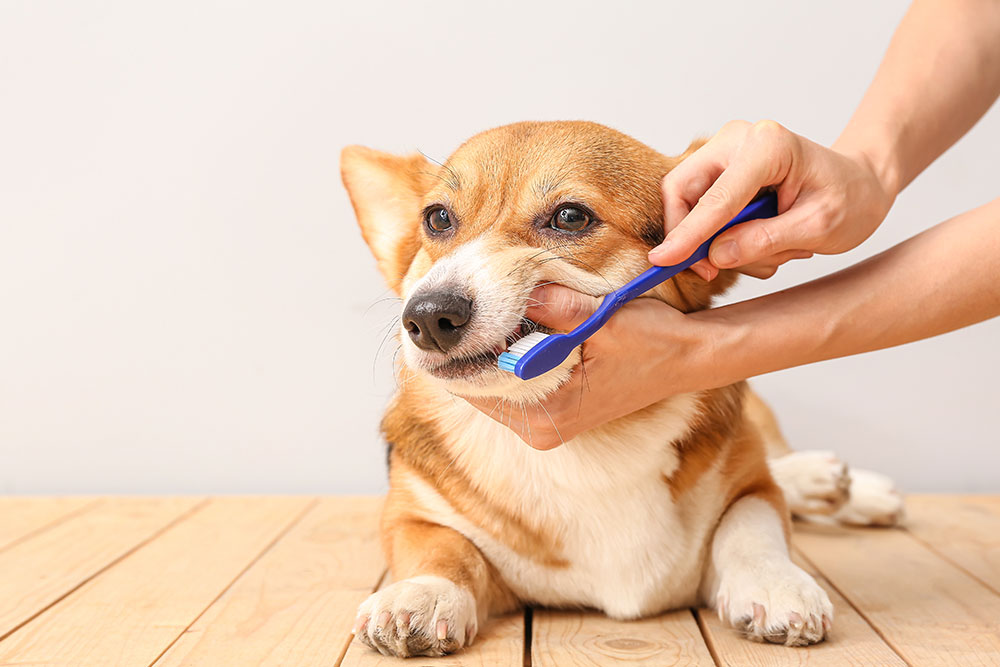
Advanced Dental Procedures for Pets
In some cases, saving a tooth is preferable to extraction. Advanced dental procedures include:
- Root Canals: If a tooth is fractured but the root remains healthy, a root canal can remove infected pulp and preserve the tooth.
- Orthodontics: While not common, orthodontic treatment can correct painful malocclusions (misaligned teeth) that interfere with eating.
- Gingival Surgery: Overgrown or diseased gum tissue may require surgical removal to prevent further infection.
These specialized treatments significantly improve quality of life for pets suffering from chronic dental pain or structural issues. Learn more about professional dental cleanings and anesthesia for pets.
Preparing for Your Pet’s Dental Surgery
Before dental surgery, we provide detailed preparation guidelines to ensure a smooth and safe experience.
Steps to Prepare Your Pet:
- Fasting: Your pet will need to fast for 8-12 hours before the procedure to prevent anesthesia complications.
- Pre-Surgical Exam: A thorough examination and bloodwork help determine if your pet is healthy enough for anesthesia.
- Tailored Anesthesia Plan: An individualized anesthesia protocol is designed based on your pet’s age, breed, and health condition.
Discover what to expect during pet surgery.
At-Home Dental Care for Pets
Preventative care starts at home. A consistent dental hygiene routine helps reduce plaque buildup and extends the time between professional cleanings.
Tips for Maintaining Your Pet’s Dental Health
- Daily Brushing – Use pet-safe toothpaste and a soft toothbrush.
- Dental Chews & Toys – Offer safe, vet-approved dental chews to reduce plaque.
- Specialized Diets – Consider dental health diets designed to prevent tartar buildup.
- Regular Vet Visits – Annual check-ups allow early detection of dental disease.
Not all dental chews are safe! Some hard bones, antlers, and hooves can cause painful fractures. Read about the potential dangers of popular dog chews.
Post-Surgery Care and Recovery
After a dental procedure, your pet may require special care for a smooth recovery.
Post-Surgery Care Instructions:
- Pain Management: We provide pain relief medication if needed.
- Soft Diet: Your pet may need to eat soft food for a few days.
- No Hard Chews or Toys: Avoid anything that could irritate or damage the surgical site.
- Monitor for Infection: Watch for redness, swelling, or discharge at the surgery site.
- Follow-Up Appointments: We schedule post-op check-ups to monitor healing.
- Use the Cone! Pets can cause more damage to painful areas- monitor your pet closely while healing.
Most pets recover quickly, and many show immediate improvements in their energy levels and appetite after resolving dental pain.
Why Choose Arcata Animal Hospital for Pet Dental Care?
At Arcata Animal Hospital, we provide comprehensive dental care with a focus on preventative medicine and pain-free treatment. Our veterinarians use state-of-the-art dental equipment and the latest techniques to ensure the best outcomes for your pet.
Our clients frequently share heartwarming stories about their pets’ transformations after dental treatments. Whether it’s a dog playing again after a painful tooth was removed or a cat finally eating comfortably, our goal is always to improve quality of life.
Meet our team and learn about our veterinary expertise.
FAQs About Pet Dental Surgery
How can I tell if my pet needs dental surgery?
Look for bad breath, difficulty eating, pawing at the mouth, excessive drooling, or visible tartar. A vet exam will confirm the need for treatment.
Is anesthesia safe for dental procedures?
Yes! Modern anesthesia is very safe when administered by trained professionals. We conduct pre-anesthetic screenings to minimize risks.
How long does recovery take after dental surgery?
Most pets recover within a few days to a week. Follow-up appointments ensure proper healing.
Maintaining Pet Dental Health
Good dental care is essential for your pet’s long-term health. By staying proactive with at-home care, routine cleanings, and professional dental exams, you can prevent painful dental disease and serious complications.
If your pet is due for a dental check-up, experiencing signs of oral discomfort, or has never had a professional cleaning, we encourage you to schedule a consultation today.

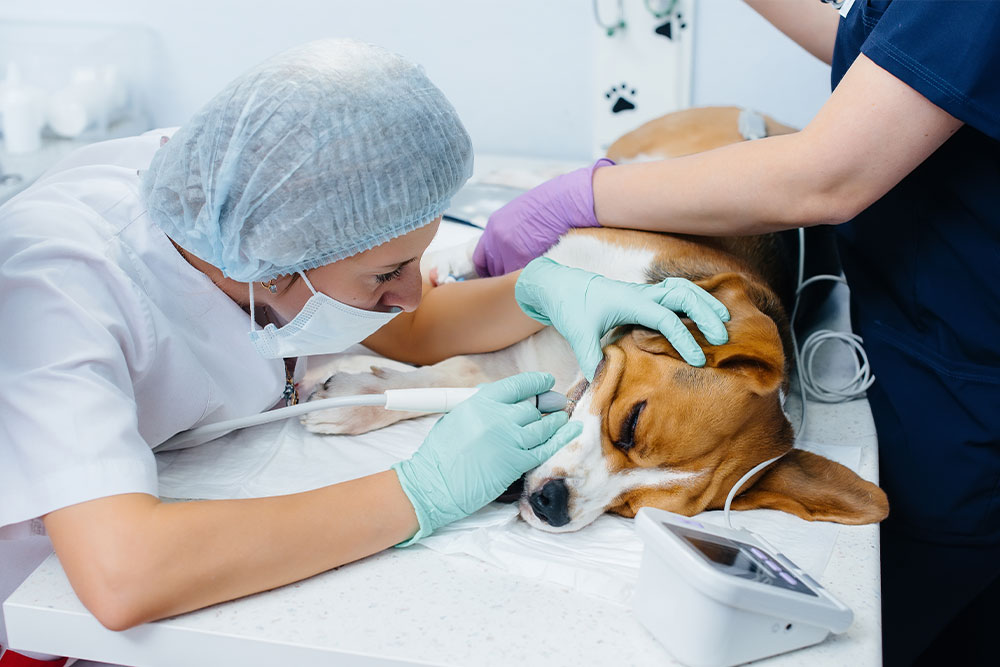
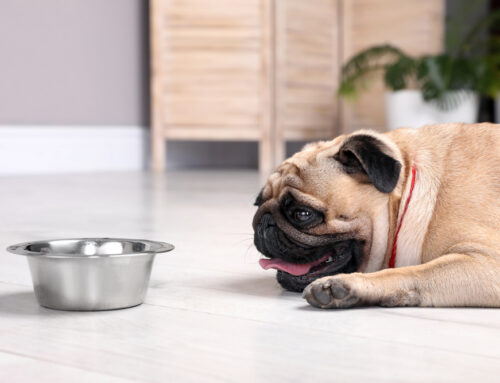
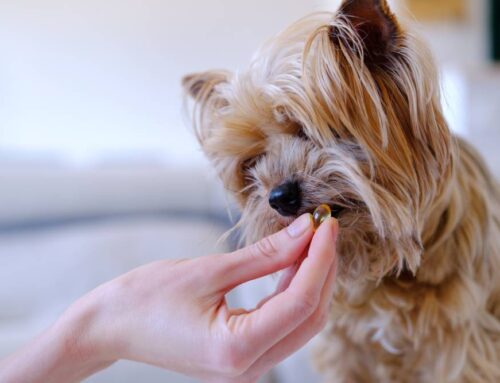
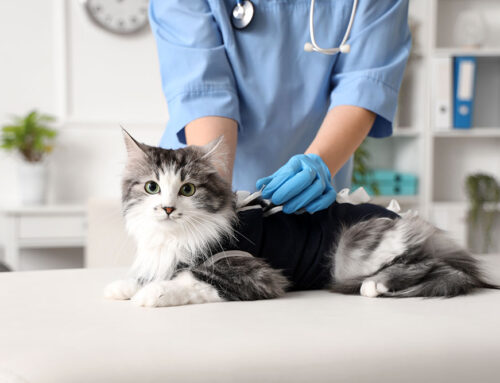
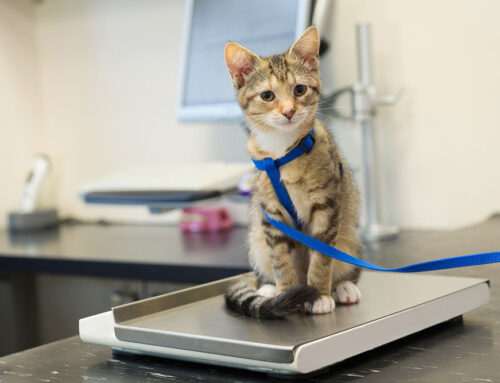

Leave A Comment